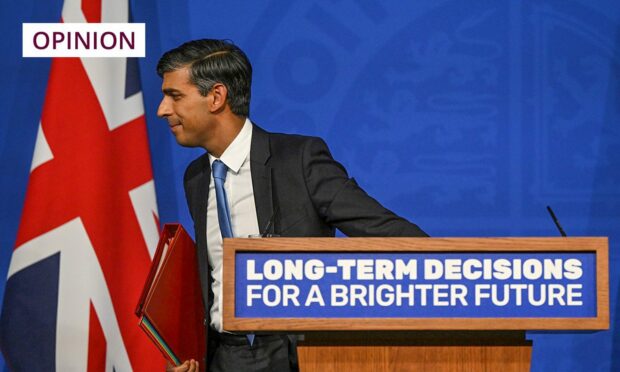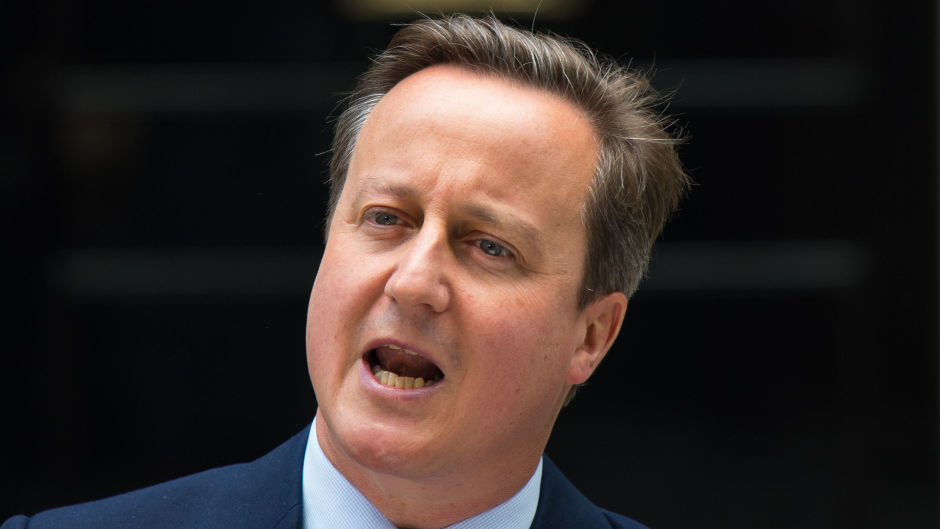It’s not fun being in a crisis, especially one that feels absolutely out of your control.
Growing up at the end of the Cold War, I used to have nightmares about nuclear bombs, especially after a teacher told us we were close enough to Rosyth to be eliminated in the immediate blast.
These days, I lose sleep over climate breakdown, now visible from the burning beaches of Hawaii and Corfu to the floods that swept Libya and Pakistan, and in the precipitous melting of polar ice caps.
Our current economic system, especially how it sources energy and uses resources, is the cause. Even oil-funded lobbyists realise it’s no longer plausible to pretend otherwise.
The denialists – including Prime Minister Rishi Sunak – are no fools, though, and they keep shifting ground. The rhetoric looks ever less and less like explicit denial, but it remains exactly as deadly.
First, it was “just not happening”, then we got: “Maybe it’s happening, but it’s not about emissions.” That became: “These small measures will help us meet distant targets that you don’t have to worry about.”
With the PM’s speech this week, denialism has taken perhaps its final form: “We will achieve those distant targets without even those small measures.” Plus: “It’s all China’s fault”, without examining who consumes what Chinese industry makes. The only place left to go is: “It’s all a bit too late, sorry.”
We will never impose unnecessary and heavy-handed measures on you, the British people.
We will still meet our international commitments and hit Net Zero by 2050. pic.twitter.com/XjXQzGVaCN
— Rishi Sunak (@RishiSunak) September 20, 2023
An earnest sermon from the prime minister about the urgency of the climate crisis was followed by promises to do less about it. He wants, instead, to keep drilling for new oil, plans to throw billions in the direction of the nuclear industry, and will extend sales of petrol and diesel cars.
The “net zero by 2050” commitment remains, though, he says – as if net zero can keep global heating within liveable bounds. In fact, Sunak supporting a target that’s decades over the horizon, even as the crisis is upon us, tells you how worthwhile that target is.
More families will have to choose between heating and eating
When politicians talk pompously about “families”, best check you’re not having your pockets picked (or, in other situations, being sold some crank moralism in disguise). And dropping or delaying policy after policy – including some he made up just to performatively drop – was justified as saving families money.
Most families – most people – are struggling with money at the moment, albeit perhaps not a prime minister worth almost three quarters of a billion pounds.
He’s also guaranteeing that people will be stuck in homes without insulation, rather than cutting their bills
If Sunak was actually looking for cheaper ways to decarbonise, that would make sense. Instead, perversely, we’ll get new nuclear: the most expensive form of power available.
He’s also guaranteeing that people will be stuck in homes without insulation, rather than cutting their bills. The shift to cheaper ways to heat homes is delayed, keeping us at the mercy of oil and gas markets. More families will have to choose between heating and eating, especially renters.
Threat of climate change won’t go away by itself
Worst of all is the Trumpian call to drill, baby, drill. It’s right to care about how fair the transition to a low-carbon economy can be, but all the climate cares about is how much oil and gas remains in the ground. And the PM’s answer is – none, unless it’s not profitable to extract.
A few hundred people in Uxbridge didn’t like what they’d been told about a minor air quality measure, so Sunak has flipped back in time by almost exactly a decade to echo David Cameron: “Cut the green crap”, while the world burns.
With the threat of nuclear war, we could essentially just cross our fingers and hope we kept rolling sixes. The Cuban Missile Crisis showed what it looked like when the dice teetered on the edge before settling on six. And we got away with it.
But, if governments sit on their hands and hope climate change goes away, there will be no lucky rolls. The inevitable outcome is degrading ecosystems, species extinctions, food system collapses, and an uninhabitable zone spreading north and south from the equator.
Pretending that “families” don’t need an inhabitable planet won’t save this discredited UK Government. But it might poison the well and demean the debate.
James Mackenzie is a freelance media and public affairs consultant and former head of communications for the Scottish Greens

